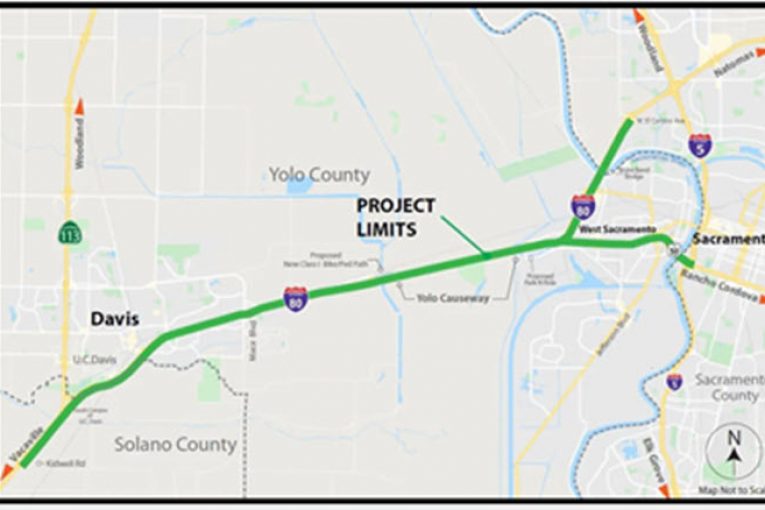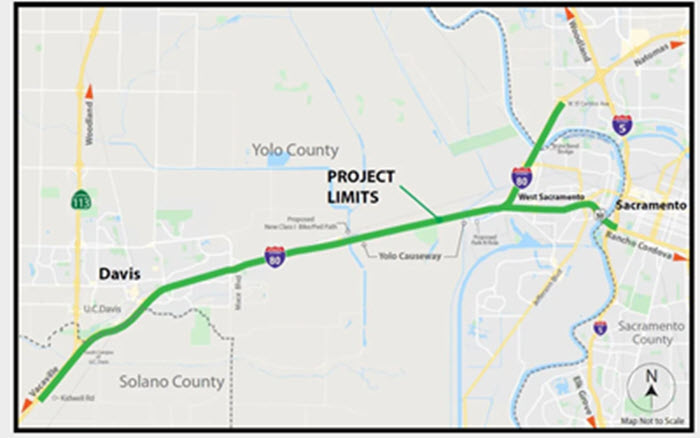

By David M. Greenwald
Executive Editor
Sacramento, CA – Local residents and the Davis City Council are among those who have questioned the environmental impact of the I-80 freeway expansion project. It was difficult to know how far those efforts would get, but they have received a major boost from a bombshell report in POLITICO on Monday which reported that a top Caltrans official was “demoted for objecting to highway expansions that will increase driving.”
Jeanie Ward-Waller, Caltrans’ deputy director of planning and modal programs, Politico reported, “was taken off the job in September.”
Her reassignment comes about three weeks after notifying agency officials “that she would file a whistleblower complaint about Sacramento-area road construction projects allegedly circumventing environmental rules.”
According to POLITICO, Ward-Waller was notified on September 14 “that she would be terminated from her role Oct. 4 and placed on administrative leave until then.”
POLITICO cites a letter showing that Ward-Waller was offered “the option of returning to her previous role at the agency or one administrative level above that.”
“We plan to press her employment-related claims and her whistleblower retaliation claims and litigation, if that’s what’s necessary,” said Christian Schreiber, attorney for Ward-Waller, in an interview with POLITICO.
“Caltrans will cooperate with any independent investigation into these claims,” agency spokesperson Edward Barrera said in a statement. “In addition, Caltrans does not comment on personnel matters.”
In a key finding for Davis and Yolo County, Ward-Waller told POLITICO in an interview “she had objected to two construction projects on Highway 80 because, she said, Caltrans’ state and federal permits improperly understated their environmental impacts.”
The projects are located on the Yolo Causeway. One project began in August and the second will begin by October 2024.
She alleges that “Caltrans improperly described the first project as “pavement rehabilitation” when it will actually widen the road to accommodate new lanes. Because of that, she said, it’s illegally using state funds that are intended only for road maintenance, not widening.”
POLIITCO adds, “She also identified in the complaint two other projects underway in the Sacramento region that she said are improperly using maintenance funding while actually widening the roads and said the Caltrans district that oversees the region is known for trying to use road-maintenance funding to widen highways.”
“This was somewhat their way of doing business,” she said.
Experts have been warning that the benefits of widening the freeway will not improve travel time, but instead will simply increase the number of vehicles on the road over time.
“You actually encourage longer commutes and further commutes and more and more discretionary trips,” Alan Hirsch has said. “History shows wider freeways never fix congestion for long.”
Hirsch, in a recent op-ed in the Vanguard, noted that the Yolo Transportation District has been largely “silent during months of criticism from the public and UC Davis researchers stating that widening I-80 will not fix congestion for long but will move us in the wrong direction on climate change.”
The criticism he shows is “based on extensive academics studies, including historical evidence that Caltrans traffic forecasts have consistently been inaccurate when they state a widening or HOV lanes will fix congestion. These Caltrans forecasts ignore the phenomenon known as ‘induced demand.’”
In July, Stephen Wheeler of UC Davis, in a letter to YCTD, argued, “Such freeway capacity expansion will raise greenhouse gas (GHG) emissions and vehicle miles travelled (VMT) in the I-80 corridor while inducing motor-vehicle-dependent suburban sprawl. It is contrary to GHG-reduction goals set by the State of California, the Sacramento region, Yolo County, and many local cities. Any congestion relief will be short-lived due to induced demand, as shown by many past freeway expansion projects.”
He added, “This guidance is clear and unambiguous, and we ask you to reiterate to Caltrans the need for cooperative study of such alternatives. If the agency continues on its current path contrary to state, regional, and local policy, we respectfully ask that you cease coordination with Caltrans on the I-80 project, and seek ways to reprogram the existing $85 million in federal money to support better public transit in the corridor.”
Now a whistleblower seems to be backing the charge that Caltrans has largely ignored these environmental findings. Worse yet, they have now retaliated against an employee speaking out.
How this will impact the project remains to be seen.


You are conflating misusing restricted funds with environmental impacts. These connections are marginal at best.
Ron G
If you read the article, it states that the misuse of restricted funds is the means being used to avoid CEQA analysis. Piecemealing projects is another classic strategy to avoid “significant” CEQA impacts. The connection is very direct in this case.
Ron G
The article states that the misuse of funds is the means of avoiding CEQA review. Piecemealing, another classic strategy, also is being used to avoid “significant” CEQA impacts. The connection is in fact central to the question of environmental impacts.
I re-read the article and it doesn’t say that CEQA avoidance is the motivation. It says that that repaving funds were used for widening. The inference is unsupported by the text.